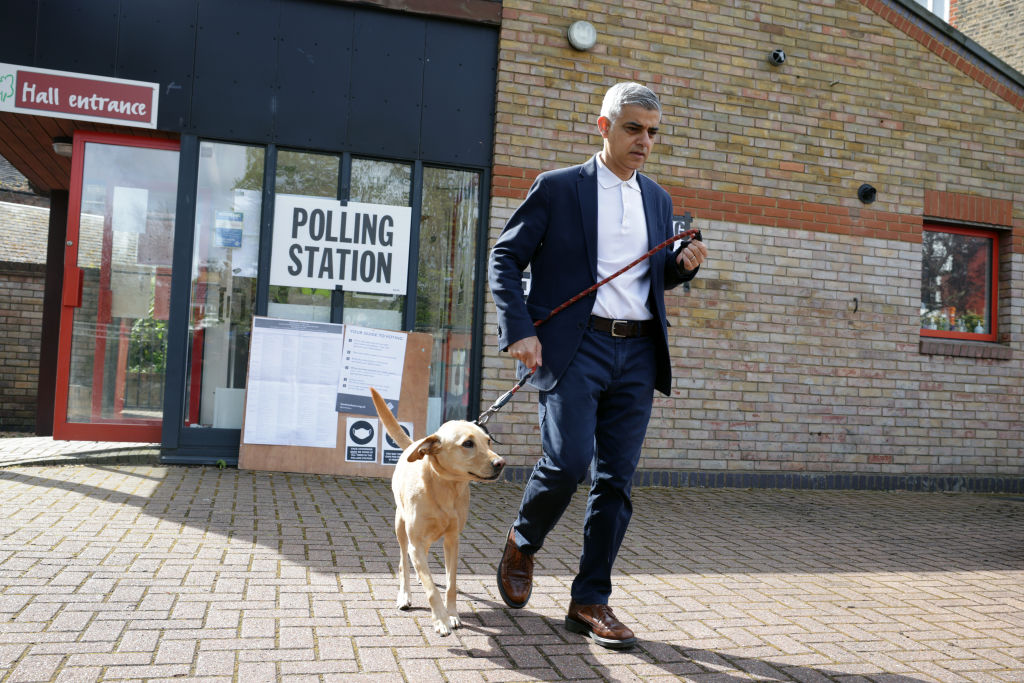Who does a capital city belong to? In the case of London tonight, one answer could be ‘Labour’, now that Sadiq Khan has claimed victory, as the party performs disastrously elsewhere.
And clearly Khan’s strong support among the left-wing, the middle class, EU nationals (who are permitted to vote for the mayoralty), and some of the largest ethnic minority communities, shows that his chippy ID politics goes down well among enough residents of the capital to keep the keys to City Hall securely in his pocket.
London’s decision to return Khan, when Labour is at such a low ebb, is a telling one
Indeed, London’s decision to return Khan, when Labour is at such a low ebb, is a telling one. Were we dealing with Manchester or Liverpool or Bristol, that would be the end of it. ‘The public gets what the public wants,’ as The Jam so succinctly put it all those years ago in ‘Going Underground’. So let the statues be toppled and let the police be subjected to the whims of fashionable London opinion.
And yet, a capital city is different. I suggest that it does not merely belong to its full-time residents but jointly to several large groups of people. For once it even seems forgivable to use that ghastly public sector term ‘stakeholders’.
In normal times several hundred thousand people commute daily into the centre of London from outside the capital. They may spend half their weekday waking hours in the capital. Should they not get a say on how transport is organised, how the streets are policed or myriad other things that have an impact upon their lives?
Then there are the millions of families who visit London regularly to go to museums, galleries, theatres and football matches or to visit monuments and other landmarks. It is their capital too. Aren’t they entitled to have a say in whether the police protect the Cenotaph from vandals or on how transport has been run?
Finally, there’s everybody else who may seldom or never visit London but is still saddled with it as a capital city sending out signals around the world about the state of the country.
By giving a mayor elected only by London residents powers over aspects of our capital that have national implications, we are placing undue power in the hands of a cabal of leftists. We know that typical London values have diverged from the typical values of the rest of the country and yet there is no prospect of capital city status being transferred to somewhere more generally representative of modern Britain.
It does not seem unreasonable for the style of policing to be in tune with the expectations of local communities. But for the daubing of graffiti on Churchill’s statue in Parliament Square to go unchallenged – as it did at times last summer – is a legitimate matter for national concern and outrage.
So it is time for some innovation. We could extend the franchise for mayoral elections to include those working full-time in the capital. Or we could transfer mayoral powers concerning life in the heart of the capital back to the relevant Secretary of State – an area corresponding to the existing congestion charge zone could perhaps be stripped from the mayor’s control.
That would leave Khan – or his future Labour successor – to suffer the indignity of not being in charge of the area around City Hall itself, or of most of the world-famous central London districts. The sweep of territory from the old city walls in the East to Hyde Park in the West and from the Imperial War Museum in the South to the British Museum in the North could be declared a national treasure.
This may all sound rather outlandish, especially in the context of clipping the wings of someone who has just won a second mandate from Londoners. But the Conservatives would do well to contemplate including something radical along these lines in their next general election manifesto. To sit back and do nothing is only going to further widen the gulf between capital and country at large.







Comments